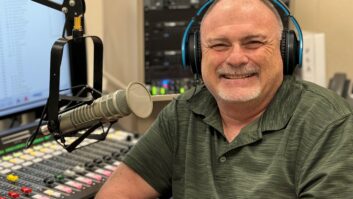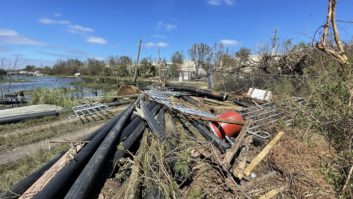Few things focus the broadcast mind like an approaching storm.
With Hurricane Matthew approaching the Florida coast and the greater southeastern U.S., Radio World collected a sampling of broadcast radio industry responses.
Hal Kneller, a contract engineer and the chair and certification chair of SBE Chapter 90 in southwest Florida, told Radio World that stations in his part of the state have been prepping; they are now outside the threat area, though they still expect squalls and heavy rain. The Solmart Media stations for which Kneller does contract work has a plan in place that, in this case, outlines who has what responsibilities, up to and during recovery; a list of contacts with emergency managers via cell, “in case we lose our land lines, so they have alternative ways to contact us”; generators fueled and tested at studio and transmitter; weekend shows and items received via FTP or internet downloaded as early as possible, “in case we lose internet on Thursday night/Friday”; and emergency supply stocks verified.
Scott Flick, writing in Pillsbury’s CommLawCenter blog, examined the critical role of the local broadcaster in emergencies.
CommLawBlog gathered suggestions and information for those in the path, including a link to the FCC’s Hurricane Information page.
The National Association of Tower Erectors issued an email — “Hurricane Preparedness and Response.” It notes that in general, beyond just towers, property owners should have their affected facilities inspected by qualified professionals to assess damage and safety.
It also says, “Many of the hazards posed to workers will occur immediately after the storm has passed, such as cleanup and restoration work. Workers and volunteers involved with flood cleanup should be aware of the potential dangers involved and the proper safety precautions. Work-related hazards that could be encountered include: electrical hazards, carbon monoxide, musculoskeletal hazards, heat stress, motor vehicles, hazardous materials, fire, confined spaces and falls.”
The group adds, “Remind everyone that their lives and the lives of their fellow workers depend on the decisions they make. The rush to fix a problem or deploy a site can seem overriding, but the cost of an accident is far more disruptive to a company than any service outage.” It provides a link to OSHA’s Hurricane Preparedness and Response page.
The ARRL noted that a hamfest and state ARRL convention scheduled this week in Melbourne have been postponed and rescheduled for Oct. 21–22.
Not surprisingly, the ham group was following the activation of an ARES Level 1condition and provided a list of amateur radio frequencies that will be available for emergency use.
Related:
FAB’s Pat Roberts on Preparing for Hurricane Matthew
Looking Back:
When Disaster Hit, They Kept WWL on the Air











